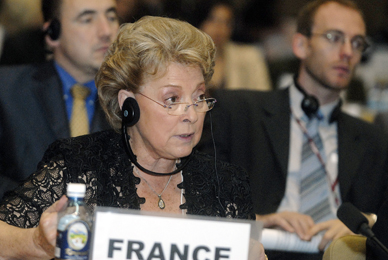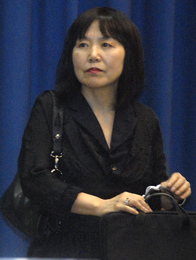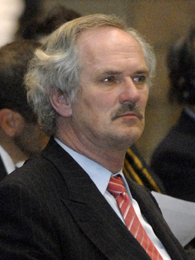|
JOIN THE IISD RS INITIATIVE |
Wednesday, 7 February 2007
On Wednesday, GC-24/GMEF delegates convened in ministerial consultations, which addressed the theme of UN reform. The COW continued consideration of policy issues and heard presentations by MEA secretariats. The drafting group convened to consider draft decisions. Contact groups on chemicals, programme of work and budget, and a UN Decade for Deserts and the Fight Against Desertification also met.
|
Ministerial Consultations: UNFCCC address
UNFCCC address |
Yvo de Boer, UNFCCC Executive Secretary, Achim Steiner, UNEP Executive Director, GC President Roberto Dobles, and Beverly Miller, UNEP Secretariat
|
| Yvo de Boer, UNFCCC Executive Secretary, addressed recent developments under UNFCCC, noting the call from the business community for ambitious policies and a clear investment perspective. Highlighting the recent IPCC report on the science of climate change, he emphasized the economic rationale for timely action and described the UNFCCC five-year work programme on adaptation and the UNFCCC Adaptation Fund. De Boer commended the UN system-wide response, noting that UNFCCC COP-13 will focus on the balance between economic growth, poverty eradication and environmental protection. Stressing the need for incentives for developing countries, he urged industrialized country leadership, voluntary approaches and assessment of current action. |

|
Panel Discussion on UN Reform
|
 |
|
|
Manjeev Puri, Ministry of External Affairs (left), said that UNEP's mandate and activities must reflect the majority of its member states' interests and global reality. He supported reform and highlighted UNEP's role in assisting developing countries through capacity building and strengthening environmental governance.
On behalf of the EU, Sigmar Gabriel, German Environment Minister (center) , called for a stronger institutional framework and for a stronger global and national political leadership. He stressed the need to convince governments that economic development and environmental policy are of equal importance, and supported an upgraded UNEO in Nairobi .
Claudia McMurray, US Assistant Secretary of State (right), commended UNEP for its “solid” work and recent partnerships, including with other UN agencies, the private sector, scientific institutions and academia. She cited the African Environment Outlook and the Bali Strategic Plan among successful UNEP outputs. |
 |
|
|
|
Nelly Olin, French Environment Minister (left), reported on the outcomes of the Paris Conference for Global Ecological Governance, noting that some 50 states and many NGOs supported the creation of a UNEO, and announced a forthcoming meeting of the “friends of the UNEO” in Morocco . She reiterated France's support to maintaining UNEP/UNEO headquarters in Nairobi.
Amb. Peter Maurer, Switzerland, Co-Chair of Informal Consultations on UN Environmental Activities (right), briefed participants on the informal consultations, highlighting the shared perspective of strengthening UNEP through stable and predictable funding, and the diverging views regarding the institutional framework. |
| Photos from Ministerial Roundtables on UN Reform |
| Reports of the facilitators of the ministerial roundtable discussions |
|
|
| Stephan Contius, Germany, Claudia McMurray, US, John Ashe, Antigua and Barbuda, Manuel Ernesto Bernales, Peru, GC President Roberto Dobles, Beverly Miller, UNEP Secretariat, Rapporteur
Elfriede-Anna More, Austria, Henri Djombo,
Republic of Congo, and Ahmad Ashour, Saudi Arabia |
| Panel Discussion on feedback on the theme of UN reform |
|
Ian Pearson, Minister of State for the Environment, UK (left), identified successes, such as the Montreal Protocol, calling for recognizing linkages between environment and development.
Jim Leape, Director General, WWF International (center), stressed UNEP's role in ensuring centrality of the environment in security and public health debates.
Elenita Daño, Third World Network (right), called for participatory and people-centred approaches in a reformed UNEP, stressing it should be an equal partner on the Sustainable Development Board. |
| Shafqat Kakakhel, UNEP Deputy Executive Director, and COW Chair Jan Dusík |
 |
|
|
Sachiko Kuwabara-Yamamoto, Executive Secretary, Basel Convention (left), said the toxic waste dumping incident in Abidjan, Cote d'Ivoire, illustrated difficulties faced by developing countries in enforcing MEAs. She outlined how persistent organic pollutants, e-waste, mercury, asbestos and medical waste are addressed under the Convention's strategic plan, calling for integrated waste management.
Marco Gonzalez, Executive Secretary, Ozone Secretariat (center), noted with satisfaction that worldwide consumption of ozone depleting substances has decreased significantly since 1999. He also observed that further reductions of HCFCs would support efforts to mitigate climate change and ozone depletion.
Algeria (right) presented the draft decision on 2010-2020 as the UN Decade for Decade for Deserts and Desertification, noting support by the GEF and the World Bank. The G-77/China and the Russian Federation supported the draft decision, while
the US, the EU and Australia opposed the draft, questioning the added value of such a Decade after the 2006 UN Year of Deserts and Desertification. |
 |
|
|
Willem Wijnstekers, CITES Secretary-General (left), called on governments to take decisions at the upcoming COP-14 to enable the Convention to continue to play a vital role in achieving globally recognized targets.
Robert Hepworth, Executive Secretary, Convention on Migratory Species (CMS) (center), highlighted the need for the MEAs to meet the challenge of globalization, outlining how wildlife watching activities have generated revenues and incomes for reinvesting in conservation.
Ndegwa Ndiang'ui, Convention to Combat Desertification (CCD) (right), commended UNEP activities on early warning and state of the environment outlining key outcomes concerning the 2006 International Year on Deserts and Desertification. |
| Ahmed Djoghlaf, Executive Secretary, Convention on Biological Diversity, with Shafqat Kakakhel (right); during his intervention, Djoghlaf urged for unprecedented efforts to halt destruction, adding that CBD COP-8 had signaled a new implementation phase involving all stakeholders. |
|
| Contact Group: Chemicals Management |
|
Contact group Co-Chairs Abiola Olanipekun, Nigeria, and Donald Hannah, New Zealand; the contact group took up the draft decisions on heavy metals (EU, in UNEP/GC/24/COW/CRP.7), illegal international traffic in hazardous chemicals (Nigeria, in UNEP/GC/24/COW/CRP.9), and SAICM (EU, in UNEP/GC/24/COW/CRP.5). |
| Contact Group: Budget and Programme of Work |
| Contact Group Chair Jan Bauer, Netherlands (left), and G-77/China delegates consulting |
|
Special Event: A Discussion on the Future of Global Environmental Governance sponsored by IISD and the Danish Ministry of Foreign Affairs |
| Adil Najam, Senior Associate, IISD, presented the results of the Global Environmental Governance study produced by IISD and funded by the Danish Ministry of Foreign Affairs |
Special Event: UNEP and UNIDO-Enhancing Synergies |
| UNIDO Director General Kandeh Yumkella and UNEP Executive Director Achim Steiner (left) and Mark Mwandosya, Minister of State for the Environment, Tanzania (right) |
| Memorandum of Understanding between NEPAD, CBD and Portugal |
| The Executive Secretary of the Convention on Biological Diversity, Ahmed Djoghlaf, the Minister of Environment, Spatial Planning and Regional Development of Portugal, Francisco Numes Correia and Ms. Estherine Lisinge Fotabong of the New Partnership for Africa's Development (NEPAD) signed a Memorandum of Cooperation to enhance human and institutional capacities in Africa for the effective implementation of the Convention on Biological Diversity and the Cartagena Protocol on Biosafety. (photos courtesy of Martin Krebs, UNEP) |
| Set up for the signing (left) and Bakary Kante, UNEP, Ahmed Djoghlaf, CBD Executive Secretary, Estherine Lisinge Fotabong, NEPAD, and Francisco Numes Correia, Portugal |
| Agreement of support between IISD and UNEP |
| Bakary Kante, Director, Division of Environmental Law and Conventions, UNEP, with Kimo Goree, Director, IISD Reporting Services, formalized an agreement of support between UNEP and IISD of ENB activities on MEAs and selected international meetings |
Press Conference: Launch of the Arab Forum for Environment and Development (AFED) |
| Prince Turki bin Nassar, Saudi Arabia, Najib Saab, Arab Forum for Environment and Development, Habib El-Habr, West Asia Regional Director, UNEP, and Narmin Osman, Iraqi Environment Minister |
|